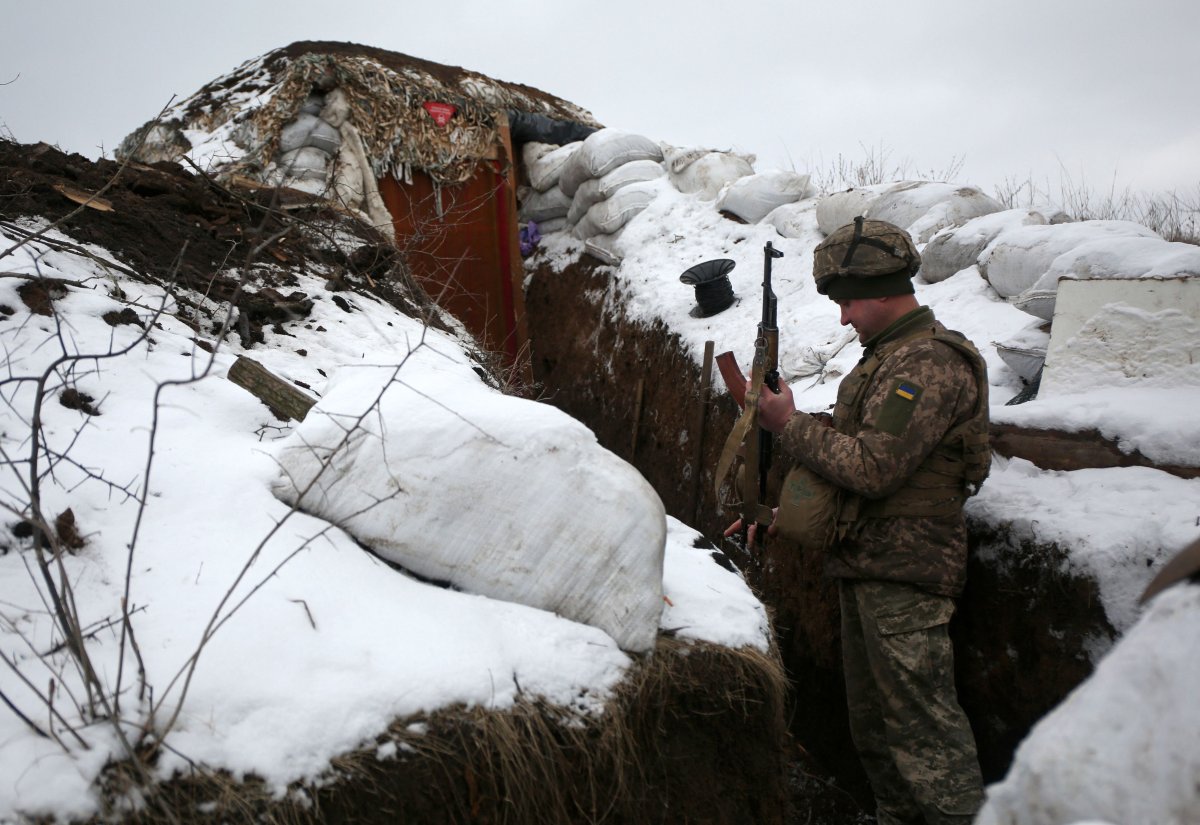Ukraine's Foreign Ministry has condemned the U.S.'s move to evacuate some American diplomats and their family members from the embassy in Kyiv, in response to the build up of thousands of troops at the Ukrainian-Russian border and the imminent possibility of war.
On Saturday, ABC News reported that the U.S. State Department was preparing to approve the evacuation of some U.S. diplomats and diplomats' families from the embassy in Kyiv. The U.K. has also taken a similar action. The orders show that some Western powers are bracing for a Russian invasion.
In a statement issued on Monday, Ukraine's Ministry of Foreign Affairs called the U.S. decision "premature and a manifestation of excessive caution."
"In fact, there have been no radical changes in the security situation recently: the threat of new waves of Russian aggression has remained constant since 2014, and the accumulation of Russian troops near the state border began in April last year," the ministry added.
The U.S. move does not mean that the Ukraine embassy in Kyiv will cease functioning, the ministry pointed out, urging Washington to "be calm" about recommendations for U.S. citizens to log their travel plans on the State Department website.
"The Russian Federation is currently making active efforts to destabilize the internal situation in Ukraine. A large amount of misinformation, manipulation and fakes is spreading in the Ukrainian and international media space in order to sow panic among Ukrainians and foreigners, intimidate business, and undermine the economic and financial stability of our state. In this situation, it is important to soberly assess the risks and stay calm," the ministry added.
The ministry later said it was "particularly grateful" to the U.S. for its "pro-active diplomatic stance" and for providing military assistance to Ukraine.
An estimated 100,000 Russian troops have built up along the eastern border of Ukraine, and talks with Western officials have failed to discourage Russian President Vladimir Putin, sparking fears of a fresh conflict in Europe.
If there is a conflict, it won't be the first time the two countries have been at war.
In 2014, Russia seized control of Crimea, following protests in Ukraine that toppled the country's pro-Russian president. Since then, Ukraine's military has been fighting a bloody conflict with Russian-backed rebels in the Donbas region in the east of the country. An estimated 14,000 have been killed since the fighting began.
On Saturday, some 90 tonnes of US "lethal aid" including ammunition for "front-line defenders" arrived in Ukraine.
But the West feels far from a united front when it comes to a potential conflict in the region. U.S. President Joe Biden made a gaffe on January 19 when he said if Russia made "a minor incursion" into the Ukraine, NATO members would be "having a fight about what to do."
The comments did little to calm nerves around Europe, with some critics suggesting that the words seemed to invite Russia to invade its neighbor. There was backlash from Ukraine, including from country's President Volodymyr Zelenskyy.
The White House also went into full damage control mode following Biden's comments. Officials said the president had been referring to cyber attacks and paramilitary activities, and not Russian troops crossing the border. U.S. Secretary of State Antony Blinken also warned Russia against invading Ukraine on Sunday.
The New York Times reported Sunday that Biden was considering sending 1,000-5,000 more troops to Eastern Europe, with the possibility of increasing that number if Russia becomes more aggressive. Should Biden go ahead with that move, it would mark a major shift from its previously restrained policy towards Ukraine.
Meantime, Germany broke ranks with NATO over the weekend, rejecting calls to provide Kyiv with weapons despite U.K. and the U.S. reiterated their commitment to helping Ukraine's military under the threat of Russia.

Uncommon Knowledge
Newsweek is committed to challenging conventional wisdom and finding connections in the search for common ground.
Newsweek is committed to challenging conventional wisdom and finding connections in the search for common ground.
About the writer
Jack Dutton is a Newsweek Reporter based in Cape Town, South Africa. His focus is reporting on global politics and ... Read more
To read how Newsweek uses AI as a newsroom tool, Click here.








